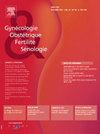Visions et répercussions de l’accès aux origines dans l’assistance médicale à la procréation avec tiers donneur : étude descriptive chez les donneurs de gamètes
IF 0.8
4区 医学
Q4 OBSTETRICS & GYNECOLOGY
引用次数: 0
Abstract
Objectives
The Bioethics Law of August 2nd, 2021 established access to origins for people conceived by gamete donation. Two years after the implementation of this disposition, what is the proportion of former gamete donors informed about access to origins, and what is their position on this matter? What could be the potential repercussions of this new law on them?
Methods
Retrospective single-center cohort study using questionnaires.
Results
When former gamete donors were asked about access to origins, only 53% of oocytes donors and 71% of sperm donors were aware of this measure. When participants were asked about the ideal method of donation, it emerged that 41% of female donors and 47% of male donors were in favour of access to their identifying data for the person resulting from the donation. More than half were in favour of access to non-identifying and medical data. If one day someone conceived from their donation requested access to their identifying data, 62% of oocytes donors and 56% of sperm donors would grant it.
Conclusions
A significant proportion of our participants expressed the desire to benefit from information on possible descendants resulting from their donation. Among the donors interviewed, only half are informed of the legislation introducing access to origins, now two years after its implementation. These results encourage us to strengthen communication efforts around access to origins.
[卵母细胞和精子捐献者身份释放的愿景和影响:配子捐献者的描述性调查]。
目标:2021年8月2日的《生物伦理法》确立了通过配子捐赠受孕的人获得来源的途径。在执行这一处置两年后,得知获得来源的前配子捐赠者的比例是多少?他们在这个问题上的立场是什么?这项新法律可能对他们产生什么潜在影响?方法:采用问卷调查的回顾性单中心队列研究结果:当前配子捐赠者被问及获得来源时,只有53%的卵母细胞捐赠者和71%的精子捐赠者知道这一措施。当参与者被问及理想的捐赠方式时,41%的女性捐赠者和47%的男性捐赠者赞成获得捐赠对象的身份信息。一半以上的人赞成获取非身份和医疗数据。如果有一天,从他们的捐赠中受孕的人要求访问他们的身份数据,62%的卵母细胞捐赠者和56%的精子捐赠者会同意。结论:我们的参与者中有很大一部分人表示希望从他们捐赠的可能后代的信息中受益。在接受采访的捐助者中,只有一半的人知道关于获取原产地的立法,现在该立法已经实施两年了。这些结果鼓励我们加强关于获取原产地的沟通工作。
本文章由计算机程序翻译,如有差异,请以英文原文为准。
求助全文
约1分钟内获得全文
求助全文
来源期刊

Gynecologie Obstetrique Fertilite & Senologie
Medicine-Obstetrics and Gynecology
CiteScore
1.70
自引率
0.00%
发文量
170
期刊介绍:
Gynécologie Obstétrique Fertilité & Sénologie est un mensuel scientifique d''information et de formation destiné aux gynécologues, aux obstétriciens, aux sénologues et aux biologistes de la reproduction. La revue, dans ses éditoriaux, articles originaux, mises au point, lettres à la rédaction et autres rubriques, donne une information actualisée ayant trait à l''obstétrique et à la gynécologie et aux différentes spécialités développées à partir de ces deux pôles : médecine de la reproduction, médecine maternelle et fœtale, périnatalité, endocrinologie, chirurgie gynécologique, cancérologie pelvienne, sénologie, sexualité, psychosomatique…
 求助内容:
求助内容: 应助结果提醒方式:
应助结果提醒方式:


